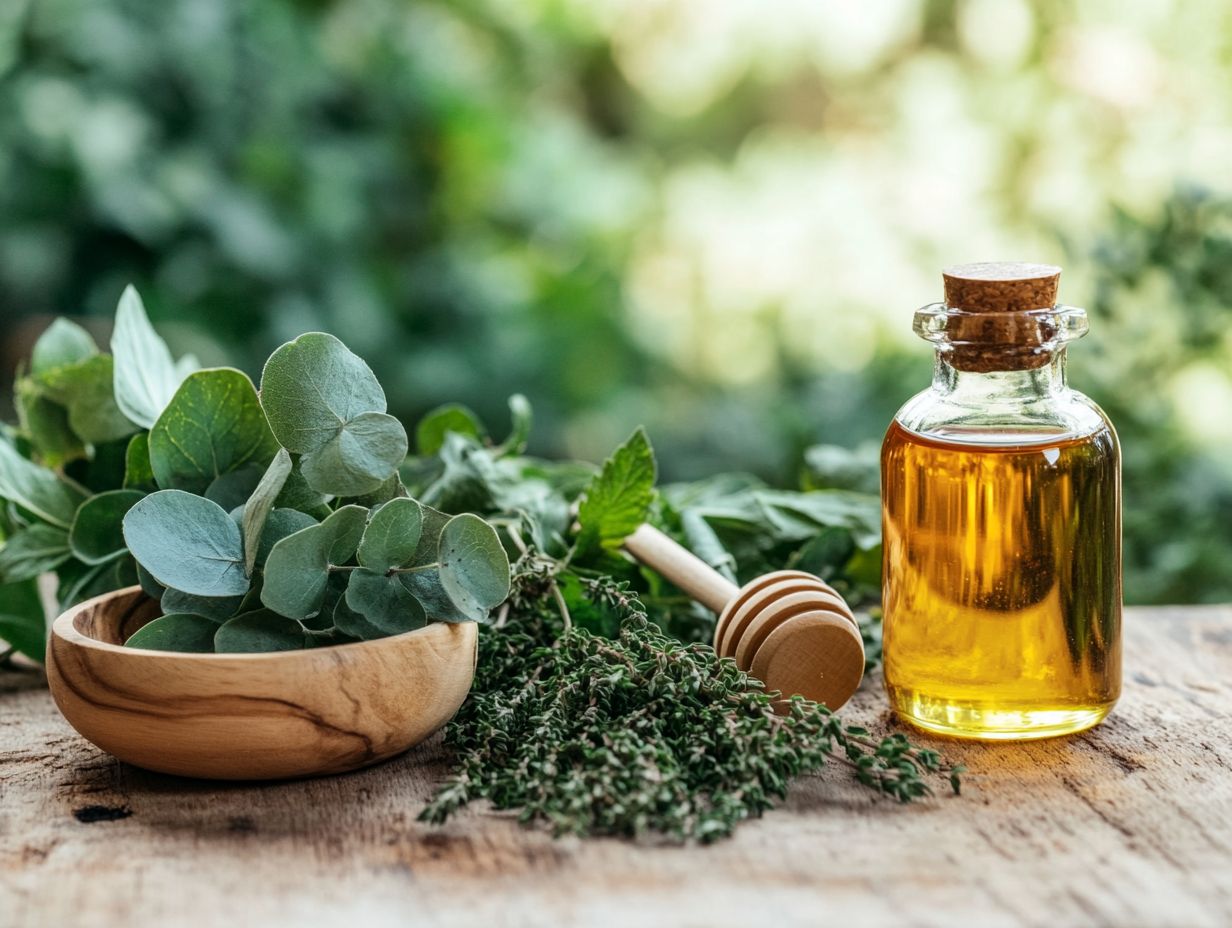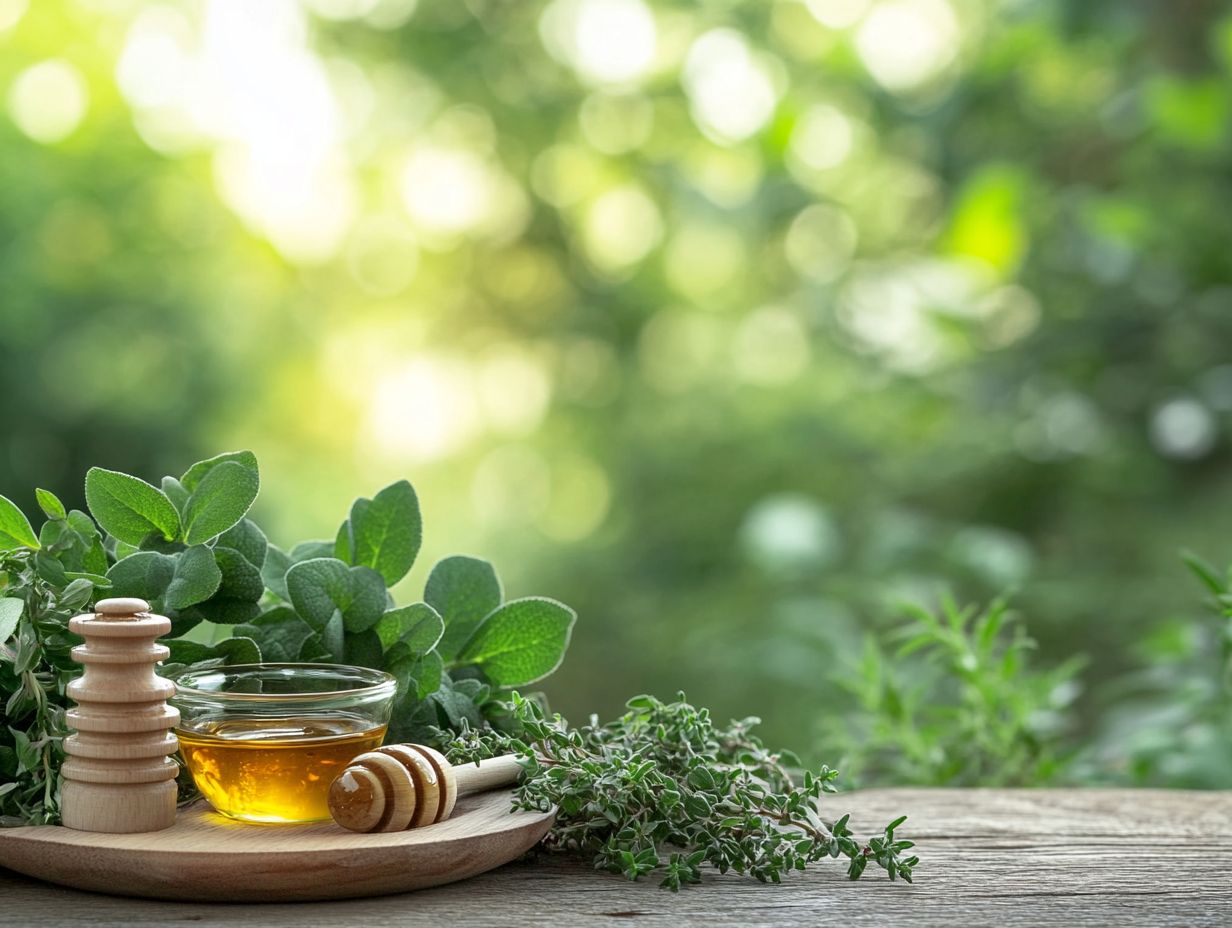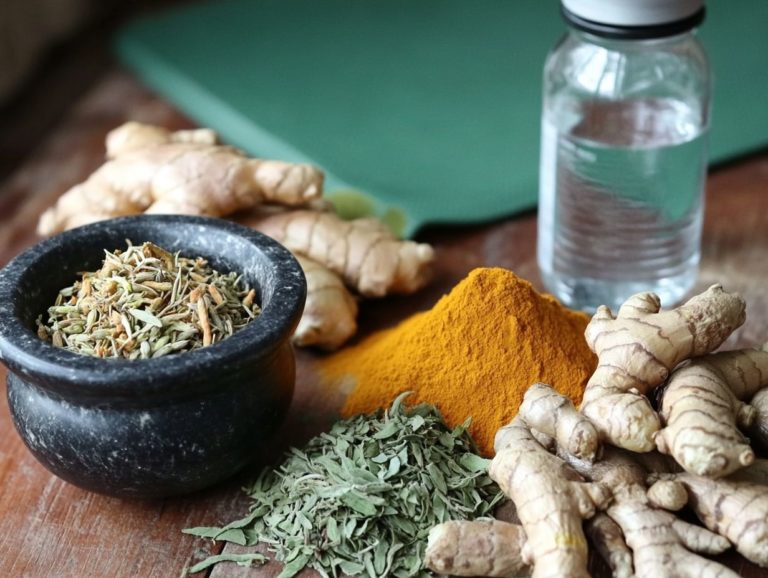The Best Herbal Remedies for Respiratory Health
Respiratory health plays a vital role in your overall well-being, yet it often goes unnoticed until problems surface. From the common cold to more chronic conditions, grasping the essentials of maintaining and enhancing your respiratory function is key. This article delves into common respiratory issues, showcases the benefits of herbal remedies, and introduces natural solutions like eucalyptus, ginger, and peppermint. Learn how to harness these powerful remedies today while considering important safety aspects, empowering you to take charge of your respiratory health in a natural and holistic way.
Contents
Key Takeaways:

- Keep your respiratory health in check to maintain overall well-being.
- Incorporate herbal remedies like eucalyptus, ginger, and thyme for better lung function.
- Always follow recommended dosages and consult a healthcare professional when using herbal remedies.
Understanding Respiratory Health
Understanding respiratory health is essential for your overall well-being, as your respiratory system is key to delivering oxygen throughout your body and expelling carbon dioxide. This system can be vulnerable to various forms of pollution, potentially leading to respiratory issues such as asthma, chronic bronchitis, and even infections like COVID-19.
Using natural remedies and incorporating herbs for respiratory health like thyme, kumerahou, and white horehound can bolster your lung health and enhance your immune response. Integrating effective breathing techniques can significantly improve your respiratory function and alleviate symptoms related to cough and mucus production.
The Importance of Respiratory Health
The significance of respiratory health cannot be overstated; it profoundly affects your ability to undertake daily activities and uphold a high quality of life. Healthy lung function is vital not just for physical endurance but also plays a crucial role in your body’s immune response, serving as a frontline defense against infections.
When your respiratory system operates at its best, it gives your body the power to fend off pathogens more effectively. Incorporating natural decongestants like eucalyptus and supportive herbs such as thyme can assist you in maintaining clear airways, thereby enhancing oxygen exchange. Integrating these elements into your daily routine can greatly enhance your overall well-being.
With robust respiratory health, you ensure that your body can function efficiently as you navigate everyday challenges.
Common Respiratory Issues
Common respiratory issues like asthma, bronchitis, and allergies profoundly affect millions globally. These conditions are often made worse by pollution and lifestyle choices.
These conditions can be a daily struggle, reminding you of the importance of clean air and healthy habits in your life.
Identifying and Addressing Respiratory Problems
Identifying and addressing respiratory problems early is crucial for effective management and a quicker recovery. It’s essential to recognize symptoms like a persistent cough or difficulty breathing.
Along with these initial signs, be vigilant about wheezing, chest tightness, or increased mucus production, as these may signal a worsening condition. Timely diagnosis often involves consulting with healthcare professionals, who may recommend imaging tests or pulmonary function tests tests that measure how well your lungs work to evaluate your lung efficiency.
Once a diagnosis is made, you ll find various treatment options available, ranging from conventional medications to lifestyle changes. Herbal medicine has become increasingly popular as a natural approach, potentially offering relief for coughs and enhancing overall respiratory health.
Exploring herbal remedies can serve as a complementary avenue alongside standard treatments, providing you with a more holistic approach to your respiratory well-being.
Benefits of Herbal Remedies for Respiratory Health
Herbal remedies have become increasingly recognized for their remarkable benefits in promoting respiratory health. They provide natural solutions that can alleviate common ailments while enhancing lung function. Explore a wealth of options for your wellness journey.
How Herbal Remedies Can Help

Herbal remedies can be invaluable allies in your wellness journey, offering solutions for cough reliefs, acting as natural decongestants, and supporting your overall lung health.
Take thyme, for instance. This remarkable herb contains thymol, a compound celebrated for its germ-fighting qualities. It soothes your throat and promotes effective mucus breakdown, making it easier to expel what you don t need.
Then there’s white horehound, known for alleviating coughs and reducing mucus production. Its active ingredient, marrubiin, relaxes bronchial tissues, creating a comforting sensation in your chest.
By incorporating these herbs into your daily routine, you can enhance your respiratory health and elevate your overall sense of well-being.
Top Herbal Remedies for Respiratory Health
Discover amazing herbal remedies that can transform your respiratory health! Ingredients such as thyme, k merahou, and white horehound truly shine in the realm of natural medicine.
Eucalyptus
Eucalyptus is a natural decongestant, making it a favored choice in herbal remedies tailored for respiratory health.
Its active compounds, especially eucalyptol, work wonders by thinning mucus and clearing the airways. This provides much-needed relief from congestion that often accompanies colds or allergies. By enhancing airflow and soothing irritated tissues, eucalyptus alleviates symptoms and fosters a sense of well-being.
Many people find great benefit in utilizing eucalyptus through steam inhalation; the steam infused with its essential oils penetrates deeply into the respiratory system, delivering swift relief. You can also use eucalyptus oil in diffusers or through topical applications to bolster lung function and establish it as an invaluable ally in your pursuit of optimal respiratory health.
Ginger
Ginger has long been celebrated in herbal medicine for its remarkable immune-supportive properties and ability to ease respiratory discomfort. This powerful root is prized for its anti-inflammatory effects, which reduce airway irritation and promote easier breathing.
Many individuals have turned to ginger-infused teas or supplements. The warm, soothing qualities provide comfort and may enhance overall respiratory health. By alleviating symptoms such as coughing and congestion, ginger emerges as a natural ally for anyone seeking to bolster their respiratory systems.
Its antioxidant content plays a vital role in reducing oxidative stress, further solidifying its importance in maintaining well-being, especially during the cold and allergy seasons.
Thyme
Thyme stands out as an exceptional herb in the realm of herbal remedies for respiratory health, known for effectively alleviating coughs and soothing respiratory irritation.
This versatile herb boasts impressive antibacterial and antifungal properties. It has been revered in traditional medicine for its ability to ease congestion and bolster lung function. Ancient civilizations, including the Greeks and Romans, recognized thyme’s medicinal prowess, often incorporating it into teas and tinctures for various ailments.
Today, you can easily weave thyme into your daily routines. Brew a comforting herbal tea, toss it into soups and stews, or inhale its essential oil for an invigorating aroma. These practices enhance your respiratory wellness and infuse delightful flavor into your culinary creations.
Don t wait any longer; start incorporating these herbal remedies today for better respiratory health! Always consult a healthcare provider before starting new herbal remedies for personalized advice.
Licorice Root
Licorice root is a renowned herb in herbal medicine, cherished for its remarkable ability to soothe coughs and bolster respiratory health.
This herb is packed with glycyrrhizin, a powerful compound that plays a crucial role in reducing inflammation and mucus production. This is particularly advantageous for those grappling with respiratory conditions like asthma or bronchitis.
By facilitating easier breathing, licorice root can significantly enhance your overall respiratory function and offer relief from congestion. Discover the joy of enjoying it in calming teas brewed from the dried root or convenient lozenges for instant relief!
Incorporating licorice root into your routine can help alleviate respiratory discomfort. It also strengthens your body’s natural defenses against respiratory irritants.
Mullein

Mullein is revered in herbal medicine for its natural soothing properties, making it an excellent choice for supporting your respiratory health.
This remarkable plant finds its way into various herbal preparations, from teas to tinctures, each designed to ease persistent coughs and alleviate respiratory discomfort.
When you consume mullein, it acts as a natural remedy that helps clear mucus from your lungs. Its anti-inflammatory properties further contribute to lung health by soothing irritated tissues and enhancing your breathing.
Whether you choose to use it alone or in combination with other herbs, this versatile remedy stands as a valuable ally in maintaining your respiratory well-being, especially during those chilly cold and flu seasons.
Garlic
Garlic is not just a culinary staple; it s a remarkable herb celebrated for its immune-boosting properties and benefits for respiratory health.
Loaded with unique compounds like allicin and sulfur, garlic can enhance your breathing by promoting mucus clearance and soothing airway inflammation.
You ll find that incorporating garlic into your meals is effortless simply toss it into stir-fries, soups, or roasted vegetables to enjoy both its robust flavor and its health perks.
Consider garlic infusions or oil extracts as popular remedies; these offer a convenient way to leverage its therapeutic benefits. Regularly including garlic in your diet can lead to noticeable improvements in respiratory function, making it a savvy choice for anyone looking to support lung health naturally.
Peppermint
Peppermint is a prized gem in herbal medicine, celebrated for its refreshing qualities and remarkable support for respiratory health.
Its active compounds, especially menthol, create a naturally soothing effect that helps open up airways and alleviate breathing discomfort.
This makes peppermint a favored option for anyone seeking relief from congestion or cold symptoms.
Incorporating peppermint into your herbal teas not only offers a delightful, aromatic experience but also enhances relaxation and fosters a sense of well-being.
When used in essential oils, it can be inhaled or diffused, amplifying its invigorating benefits and making it an incredibly versatile remedy for both physical and mental relief.
Unlock the Power of Herbal Remedies for Your Respiratory Health!
Grasping the appropriate use of herbal remedies for respiratory health is crucial for maximizing their benefits while ensuring both safety and effectiveness.
Methods and Dosages
You have a range of methods at your disposal for administering herbal remedies aimed at enhancing respiratory health, each requiring specific dosages to ensure effective relief.
Infusions, decoctions, and tinctures are great options. Infusions gently extract beneficial compounds from delicate herbs by steeping them in hot water, making them ideal for softer foliage. On the other hand, decoctions involve simmering tougher plant materials for a more robust extraction of their medicinal properties.
Tinctures, using alcohol or glycerin as a solvent, provide a concentrated form that s easy to administer but require careful consideration of dosages. It s crucial to consult with a healthcare provider to determine the most suitable method and appropriate dosage, especially if you have underlying health conditions or are pregnant.
Start incorporating these herbal remedies today for a healthier, more vibrant respiratory system!
Precautions and Safety Considerations
While herbal remedies can offer remarkable benefits for your respiratory health, it s essential to keep precautions and safety measures in mind to avoid any unwanted effects.
Some herbs can trigger side effects like allergic reactions or stomach issues. If you re on prescription medications, be cautious. Interactions can pose significant risks, especially if you have chronic health conditions.
Take echinacea and garlic, for instance. These herbs can either increase or decrease the effects of blood thinners and other medications.
This highlights the necessity of consulting with healthcare professionals before starting any herbal treatment regimen. They can provide personalized advice and ensure that the remedies you choose are both safe and suitable for your unique health needs.
Frequently Asked Questions

What are the best herbal remedies for respiratory health?
- Eucalyptus
- Ginger
- Turmeric
- Licorice root
- Peppermint
- Mullein
How does eucalyptus help with respiratory health?
Eucalyptus has anti-inflammatory properties and can help loosen mucus and clear the airways, making it easier to breathe.
Can ginger help with respiratory issues?
Yes, ginger has antiviral and antibacterial properties that can help boost the immune system and reduce inflammation in the respiratory tract.
Is turmeric effective for respiratory health?
Turmeric contains curcumin, which has antioxidant and anti-inflammatory effects that can help reduce inflammation and improve respiratory health.
How can licorice root benefit respiratory health?
Licorice root has been traditionally used to treat respiratory conditions such as coughs and sore throats. It has anti-inflammatory properties and can also help soothe irritated airways.
It is important to consult with a healthcare professional before using any herbal remedies, especially if you have any underlying medical conditions or are taking any medications. Some herbs can interact with medications, so check for potential interactions.
Explore the amazing benefits of these herbs! But remember, safety comes first. Consult your healthcare professional today to ensure safe herbal usage.




